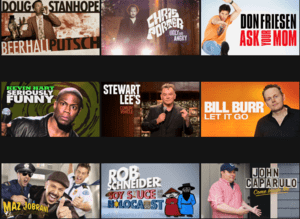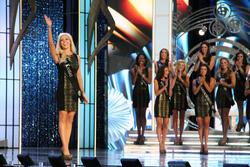Netflix and No-Chill?
I am the funniest person I know. Out of all of the aspects of my identity, my sense of humor is probably my favorite. I say my jokes loudly; I laugh at the things I say even if nobody else does. Shari Short asserts in her article, "Jewish Funny", that humor is a common ground for Jews. Self-deprecation and sprinklings of Yiddish go a long way when identifying fellow members of the Tribe by jokes alone.
Short, who is a comedian herself, argues that a sense of humor and Jewish cultural identity go hand in hand. This is an assertion with which I whole-heartedly agree. As Jews, we truly can be “painfully self-deprecating and self-referential,” as Short states, and this is something truly incredible. In a world where so much of mainstream humor seems to rely on jokes made at the expense of others, Jewish comics intuitively look inward for material. We are always, lovingly, the butt of our own jokes. I learned that it’s okay to make fun of myself and love myself at the same time; and given this, I believe that it’s vital to look critically at how Jewish humor is perceived through a feminist lens as well as a cultural one.
I like to say that Jewish comedy has a holy trinity of sorts: Seinfeld, Samberg, Sandler. This isn’t to say that other Jewish comedians haven’t been impactful or present within my own life or within pop culture as a whole, but it is to say that, societally, we have a distinctive idea of what Jewish comedians are like. When I was coming into my own as a real person, the references to Jewish comedy always fell to one of these three things: 1. the funky bass line and/or Soup Nazi episode of “Seinfeld” 2. the one Jewish guy on SNL (which is funny because there are so many Jewish people on SNL) and 3. the Hanukkah Song. As I transitioned into high school, the ultimate Jewish dude-bro duo of Franco/Rogen became a definitive fourth tier because everyone was old enough to watch “Pineapple Express,” but the previously mentioned Big Three still stood.
It’s interesting that this triad is so prominent in my psyche considering that I also grew up with two thirds of the cast of “Friends,” Fran Drescher, Sarah Silverman, and more recently, the comedy power team that is Ilana Glazer and Abbi Jacobsen of “Broad City.” Clearly, funny Jewish women haven’t been completely absent from my comedy worldview, but I believe that my own comedic associations stem from the lack of female representation in mainstream comedy. For example, Netflix has 159 stand-up comedy specials available to stream right now. Only 22 of those are by women. This, in light of the resurgence of the “Netflix and chill” meme, is what I like to call a “no-chill situation”.
Part of the problem is that, in my experience, girls aren’t socialized to be funny. The archetypal class clown is a goofy (but still endearing), usually lanky, boy with a limited filter and loud voice to match. The wit that goes along with both stand-up and situational comedy is often associated with the boisterous class clown, and girls are not expected to participate; we are supposed to be more emotionally mature and not make as many fart jokes in elementary school classrooms, and this mentality permeates our daily lives as well.
Jewish humor is so deeply ingrained into Jewish culture that one is inseparable from the other. If, within Jewish environments, the self-referential and self-deprecating aspects of humor are encouraged by group dynamics in general; why do I instinctually refer to the wholly male Big Three as my prototype for Jewish comedy? It’s because girls don’t think that they’re funny. This is not an issue of humor existing, but it is an issue of confidence in said humor. Considering the surprised remarks along the lines of, “Oh wow, you’re funny for a girl.” that I myself have witnessed after cracking a killer joke, it doesn’t seem like most of society is confident in female comedians either.
More girls need to think that they’re funny, because girls are really funny. More Jewish girls need to realize that our heritage offers a unique sense of understanding and a different, hilarious, way of looking at things; but it’s hard to prompt any sort of realization when we only make up 13.8% of instant-stream stand-up.
This piece was written as part of JWA’s Rising Voices Fellowship.







